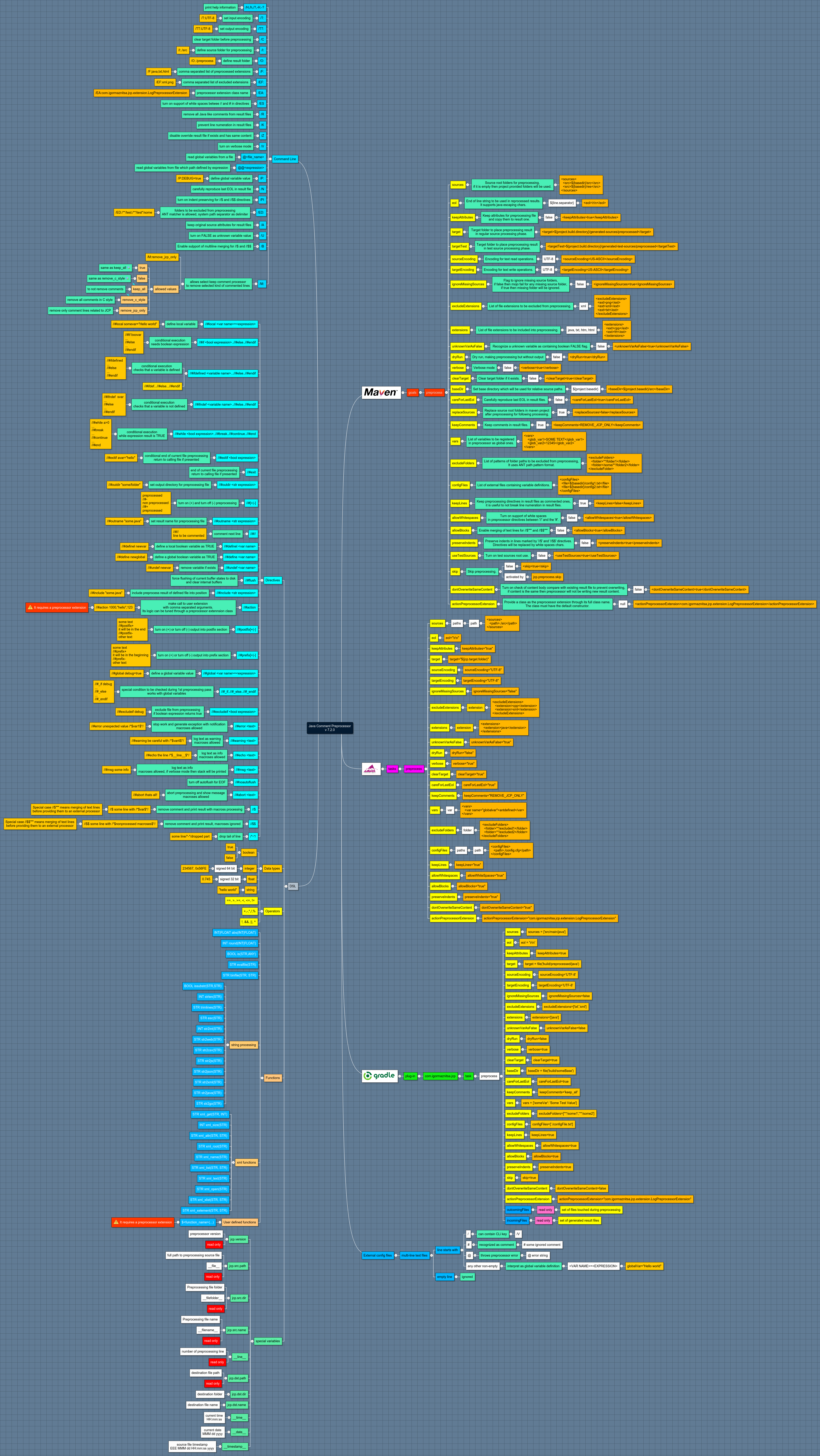7.3.0 (11-okt-2025)
- added way to manipulate current JCP text buffers as string variables:
jcp.text.buffer.all,jcp.text.buffer.middle,jcp.text.buffer.prefixandjcp.text.buffer.postfix - added way to find
PreprocessorExtensionandSpecialVariableProcessoramong Java services - refactoring of API for
SpecialVariableProcessorandCommentTextProcessor - replaced single string property
actionPreprocessorExtensionby string listactionPreprocessorExtensionsto provide way for many preprocessor extensions. - internal refactoring mainly to provide way for multiple external services implementing extensions
7.2.1 (21-jul-2025)
- refactoring of CommentTextProcessor call
- refactoring
Originally developed in 2002, the preprocessor tool emerged from the need to manage diverse sources for J2ME devices efficiently. It aimed to streamline altering specific calls' positions across different devices, optimizing the development process. With Java as the primary technology, the tool was fine-tuned for C/Java family languages, capitalizing on their import sections and C-comment style.
Initially a closed project, it transitioned to an open-source initiative in 2011. Today, it stands out as a potent two-pass Java preprocessor, adept at understanding document structure (prefix, body, and postfix), incorporating loops, and utilizing XML files as data sources. Its capabilities extend to generating static websites.
The preprocessor now exists as a comprehensive uber-jar bundled with interface code for Maven, ANT, and Gradle, seamlessly integrating with these tools. It requires a minimum JDK of version 1.8.
Moreover, various Linux repositories offer the preprocessor as a package, commonly named libcomment-preprocessor-java, simplifying its accessibility for users.
The Preprocessor can work as:
- CLI tool
- Java JAR-library
- Maven goal (generated Maven mojo site)
- ANT task
- Gradle task
The preprocessor has been published in the Maven Central.
<build>
<plugins>
...
<plugin>
<groupId>com.igormaznitsa</groupId>
<artifactId>jcp</artifactId>
<version>7.3.0</version>
<executions>
<execution>
<id>preprocessSources</id>
<phase>generate-sources</phase>
<goals>
<goal>preprocess</goal>
</goals>
</execution>
</executions>
</plugin>
...
</plugins>
</build>
The uber-jar can be started directly under Java through CLI interface. Let's take a look at short example below how to start it in command line under Linux:
java -jar jcp-7.3.0.jar --i:./test --o:./result
The example above just preprocessing files from ./test folder (which extensions allowed to be preprocessed by default), and placing result files into ./result folder. Keep in your mind that the preprocessor processing not all files, for instance XML files will not be preprocessed by default. Files which extension not marked for preprocessing will be just copied (of course if the extensions is not in the excluded extension list)
More complex example:
java -jar jcp-7.3.0.jar --c --r --v --f:java,xml --ef:none --i:./test --o:./result '--p:HelloWorld=$Hello world$'
- --c clear the destination folder before work
- --r remove all Java-style comments from preprocessed result files
- --v show verbose log about preprocessing process
- --f include .java and .xml files into preprocessing (by default the preprocessor doesn't preprocess XNL files and the extension should to be defined explicitly)
- --ef don't exclude any extension from preprocessing
- --i use ./test as source folder
- --o use ./result as destination folder
- --p define named global variable HelloWorld? with the 'Hello world' content
- --z turn on checking of file content before replacement, if the same content then preprocessor will not replace the file
- --es allow whitespace between comment and directive (by default it is turned off)
- Prepare sources for Javassist
- Make multi-versioned JAR for JEP-238
- Generate static file from XML sources
- Simple Android Gradle-based project
In Java the only allowed way to inject directives and to not break work of tools and compilers - is to use commented space, so that the preprocessor uses it.
//#local TESTVAR="TEST LOCAL VARIABLE"
//#echo TESTVAR=/*$TESTVAR$*/
//#include "./test/_MainProcedure.java"
public static final void testproc()
{
System.out.println(/*$VARHELLO$*/);
System.out.println("// Hello commentaries");
//#local counter=10
//#while counter!=0
System.out.println("Number /*$counter$*/");
//#local counter=counter-1
//#end
System.out.println("Current file name is /*$SRV_CUR_FILE$*/");
System.out.println("Output dir is /*$SRV_OUT_DIR$*/");
//#if issubstr("Hello","Hello world")
System.out.println("Substring found");
//#endif
}In opposite a regular document, a Java document has as minimum two sections - prefix (where situated import and special information) and body. For access to such sections there are special preprocessing directives //#prefix[-|+], //#postfix[-|+]. They allow turning on or off output into prefix and postfix sections.
//#prefix+
import java.lang.*;
//#prefix-
public class Main {
//#prefix+
import java.util.*;
//#prefix-
public static void main(String ... args){}
}Sometimes it is very useful to remove totally all comments from sources, such possibility included into JCP and can be activated with either a special flag or command line switcher. The example below shows how to remove all comments with CLI use:
java -jar ./jcp-7.3.0.jar --i:/sourceFolder --o:/resultFolder -ef:none --r








